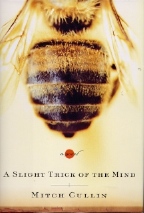A Slight Trick of the Mind
Mitch Cullin
Nan A. Talese / Random House
US Hardcover First Edition
ISBN 0-385-51328-3
Publication Date: 04-19-2005
253 Pages; $23.95
Date Reviewed: 06-01-05
Reviewed by: Rick Kleffel © 2005

REFERENCES
COLUMNS
|
|
|
A Slight Trick of the MindMitch CullinNan A. Talese / Random HouseUS Hardcover First EditionISBN 0-385-51328-3Publication Date: 04-19-2005253 Pages; $23.95Date Reviewed: 06-01-05Reviewed by: Rick Kleffel © 2005 |
|
|
REFERENCES |
COLUMNS |
Sherlock Holmes is ninety-three years old and living in a remote Sussex farmhouse in Mitch Cullin's 'A Slight Trick of the Mind'. It's 1947, and while the world has weathered two wars, Holmes has kept himself to himself, tending to his apiary in the wild English countryside. Contrary to the cover copy, Cullin does not humanize the great detective. Instead, he traps the mythic fictional character in an aging human shell. It is a fate we all shall share, a fate the world around him has shared. The century he was born in, within which he created himself has long passed, and in the bright glow of Hiroshima he sees life reborn amidst chaos and destruction. Cullin's intricately plotted and quietly written novel achieves the power of the dead whispering to us in our dreams.
'A Slight Trick of the Mind' is written with deceptive simplicity, but ultimately proves to be much more complex than the reader realizes. Holmes has just returned from a trip to Japan, summoned abroad by Mr. Umezaki, a correspondent who shares his interest in the revitalizing properties of royal jelly and the prickly ash, a weedy plant that grows on the beaches of Shimonoseki. He shares his farmhouse with his cook, Mrs. Munro, and her young son Roger, who has become something of an understudy for Holmes as a beekeeper. As the days grow long and Holmes' memory grows short, he discovers the pages of a narrative that he himself wrote after the departure of John Watson. Roger has discovered these pages as well, and waits for, hopes for Holmes to complete his story.
Cullin's vision of Sherlock Holmes is realized with close, careful prose that envelopes the reader as Holmes ailing body imprisons his soul. Inside, Holmes is every bit as calculating and coldly intelligent as H. G. Wells' Martians. He's a human recorder, a camera of the soul lacking one himself. But the body within which the genius must live is slowly decaying despite his quaint efforts to fight it. 'A Slight Trick of the Mind' reads very much like a novel by Henry James. It is a piercing observation of intellect and frailty, one seemingly unstoppable, the other actually unstoppable.
Of course, the advantages of having Sherlock Holmes as your main character are considerable, even if he is enfeebled. Cullin's other characters take on a photographic clarity and achieve a depth that is heartbreaking, though the perceiving intelligence only barely has a heart. But this novel belongs to Holmes, the struggling, cranky inhuman genius trapped within an all-too human frame.
Cullin's story ambles off into the fields with a misleading ease. We see Holmes at home, Holmes in Hiroshima and hear his account of a minor case long left unfinished. Like Holmes, our perceptions at first feel trapped in the seemingly rambling narrative. Of course this is where a slight trick is played upon the reader. There's not a word wasted, not a scene described that does not smoothly slip into Cullin's cunningly constructed story.
Holmes gets to star not only in Cullin's narrative, but in the Doyle-style adventure included within the novel. "The Glass Armonicist" is this novel's Holmes' attempt to duplicate the storytelling style of Watson, and the tale reverberates within the novel as well. We first encounter the tale when Roger discovers it sealed in a box amidst Holmes' papers. He reads and re-reads it, hoping that Holmes will deign to finish the story. Events within the novel compel him to do so. Cullin hits every grace note perfectly in this tale within the novel.
As the threads weave together into a breathtaking finale, each part proves to be perfectly pitched, precisely fitted. Cullin does an outstanding job of using the iconic character of Sherlock Holmes to speak poignantly to the subject of the effects of aging on the human mind and body. Our understanding of Holmes helps inform our understanding of the process of aging, with the help of Cullin's cunning, intelligent story. The quality of the prose, the complexity of the characters and the layers of plot seamlessly and coalesce into a great novel. 'A Slight Trick of the Mind' proves to be a major pleasure to read.